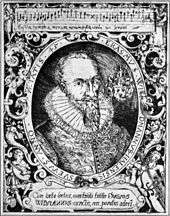Erasmus Widmann

Erasmus Widmann
Erasmus Widmann (1572–1634) was a South German composer.
Widmann was born at Schwäbisch Hall, and studied in Tübingen. His first musical positions were in Eisenerz (1595), Graz (1596), Schwäbisch Hall, and from 1602 Kapellmeister to Count Wolfgang von Hohenlohe-Weikersheim till the count's death in 1610.[1] Finally Widmann was cantor and organist at Rothenburg ob der Tauber.[2]
Works
A large quantity of dances and songs.
- Drei Motetten[3]
- Die Musikalische Kurzweil (1611), modern edition Verlag C. Hofius Ammerbuch, 2012, ISMN 9790502480837[4]
- Musikalischer Tugendspiegel (1613)
- Canzonas Intradas and Galliard (1618)[5][6]
Recordings
- Widmann, Erasmus: »Piorum suspiria. Andechtige Seufftzen unnd Gebet umb den lieben Frieden ...«. Rothenburg o.d.T.: Simon Halbmayer, o.J. (1629). 30 kürzere Sätze zu 3 und 4 Stimmen mit jew. etlichen Strophen. Nur die ersten 7 Sätze beziehen sich auf den Frieden, diese vierstimmig (SATB). On Friedens-Seufftzer und Jubel-Geschrey - Music for the Peace of Westphalia. Weser-Renaissance Ensemble Bremen dir. Manfred Cordes. cpo
References
- ↑ (Waldenburg, 14 June 1546 — Weikersheim, 28 March 1610)
- ↑ John Denison Champlin, William Foster Apthorp Cyclopedia of Music and Musicians: Naaman-Zwillingsbrüder 1899
- ↑ sheet music
- ↑ Infos zu Person und Werk Erasmus Widmann
- ↑ sheetmusicplus.com
- ↑ scores
Katalog der Deutschen Nationalbibliothek
This article is issued from Wikipedia - version of the 5/18/2016. The text is available under the Creative Commons Attribution/Share Alike but additional terms may apply for the media files.